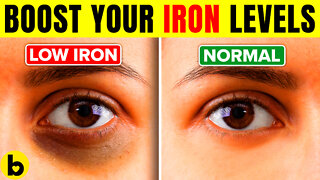How To Fall Asleep In 2 Minutes According To The US Navy
15 tips that will get you to fall asleep faster. If you’re having trouble sleeping, this video might just help you get over all your sleeping woes. The bad news is you’re here because you’re having trouble sleeping. The good news is there is a multitude of sleep tips out there to help you get a better rest at night!
#Sleep #FallAsleep #FallAsleepFast
Music:
https://www.youtube.com/audiolibrary/...
Summary:
1. Get rid of those pesky light sources. When any source of light (for example, your iPhone, laptop or television) manages to pass through your closed eyelids, it can delay your brain from releasing the sleep-promoting hormone melatonin. “Light is a powerful signal to your brain to be awake,” explains Dr. Shives, a board-certified sleep medicine doctor.
2. Keep it cool. You fall asleep faster in a slightly colder environment. Keep your room a cool temperature but not cold, which can wake you up more. Experts usually recommend setting your bedroom thermostat between 65° and 75°F.
3. Avoid naps. Power napping may help you get through the day but could be the culprit if you find yourself unable to fall asleep at night. If you need to nap, nap early or not at all.
4. Exercise daily. According to the National Sleep Foundation, people sleep significantly better if they get at least 150 minutes of exercise a week. The study showed exercise provided a 65% improvement in sleep quality.
5. Consider taking a melatonin supplement. If you are having trouble sleeping, you can also consider taking a melatonin supplement. As mentioned earlier in this video, melatonin is a potent hormone naturally produced in the body to help regulate our circadian rhythm or natural body clock.
6. Reconsider sleeping with furry friends. Cats can be active at inconvenient hours and dogs can unintentionally wake you up with movement or noise. More than half of people who sleep with their pets say animals disturb their slumber, according to the Mayo Clinic Sleep Disorders Center.
7. Stop smoking and avoid alcohol. Nicotine (found in cigarettes) is a stimulant, and stimulants can prevent you from falling asleep. Don’t worry that quitting will keep you up at night, either: the after-effects of quitting will only last about 3 nights but pay out long-term.
8. Don’t look at the clock. Staring at the time before bed, or when you wake up in the middle of the night, can actually increase stress and make sleeping more difficult.
9. Turn on the white noise. Sound machines produce a low-level soothing noise that not only helps you sleep but can also help you tune out other disturbances so you can fall asleep easier.
10. Keep a sleep diary. Try tracking your sleep every day for at least 2 weeks. Write down even small details such as what you ate close to bedtime and what exercise you got. Compare your sleep patterns and adjust accordingly. You should also write down your thoughts in your sleep diary. The number one sleep complaint
11. No caffeine after 2 pm. That includes coffee, tea, pop…anything with caffeine. Caffeine, like nicotine, is a stimulant that stays in your system for many hours and can prevent your brain from entering deep sleep or prevent you from falling asleep altogether.
12. Cheese and crackers. It might sound strange but this is actually the ideal snack to munch on a couple hours before bedtime. It combines carbohydrates and calcium-containing amino acids that boost serotonin, a brain chemical that helps you feel calm.
13. Take a relaxing bath or a hot shower. Studies have shown it can improve overall sleep quality and help you fall asleep faster.
14. Spray a sleep-inducing scent. Certain smells, such as lavender, help with relaxation and overall sleep quality. Research done by psychologists at Wesleyan University found lavender increased slow-wave sleep. Invest in a diffuser or simply add a few drops of essential oil and water in a spray bottle.
15. Rule out a sleep disorder. An underlying health condition may be the cause of your sleep problems, such as sleep apnea. Other common medically diagnosed issues include sleep movement disorders and circadian rhythm sleep/wake disorders. If you suspect that you have a sleep disorder, contact your doctor to find out what may be causing your sleep issues. In fact, it is always best to speak to a doctor before jumping to any conclusions about your health or considering any forms of treatment.
-
 9:02
9:02
Bestie
1 year ago7 Ways To BOOST Your IRON Absorption
575 -
 0:08
0:08
DogSkux
3 years agoCavalier Fall asleep #shorts
39 -
 LIVE
LIVE
The Charlie Kirk Show
1 hour agoKamala: "Grassroots" or Astroturf? + The Act Blue Scam | O'Keefe, Seifert, Huckabee | 7.26.24
10,625 watching -
 59:07
59:07
The Dan Bongino Show
3 hours agoThe Secret Service Has A New Leader, Same As The Old Leader (Ep. 2295) - 07/26/2024
395K1.16K -
 DVR
DVR
Benny Johnson
2 hours agoI Just Left The Trump Assassination Site | The TRUTH Is Far Worse Than You Can Possibly Imagine
55.3K130 -
 1:04:15
1:04:15
Steven Crowder
4 hours agoThe Kamala “Surge” Myth: Should Trump be Worried?
195K347 -
 LIVE
LIVE
Film Threat
20 hours agoDEADPOOL & WOLVERINE PROVES MALE AND PALE IS MONEY!!! | Film Threat Livecast
344 watching -
 2:58:18
2:58:18
Wendy Bell Radio
7 hours agoIt Won't Be Kamala
70.7K78 -
 LIVE
LIVE
Midnight's Edge
3 hours agoDisney's Gina Carano loss, and Deadpool & Wolverine Win! | MEiTM #592
421 watching -
 1:18:33
1:18:33
Caleb Hammer
17 hours agoVile Cheater Steals Married Men And Loses Everything | Financial Audit
14.1K3